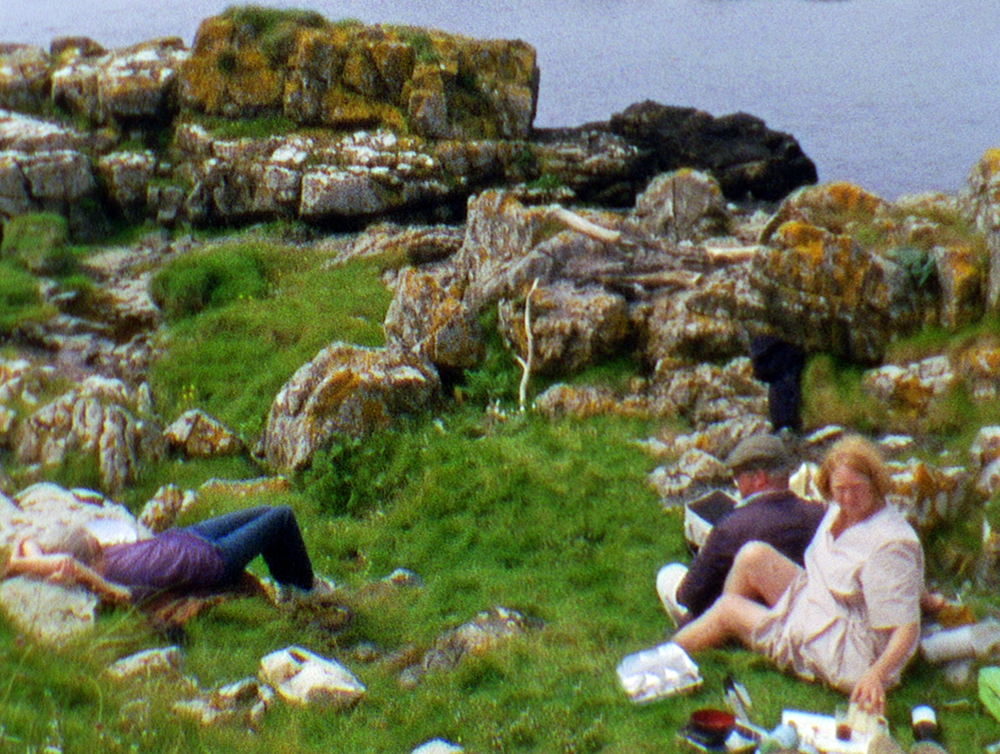In his sixth exhibition at Sadie Coles HQ, TJ Wilcox presents three films, each a portrait of a man. In two new works, the artist gravitates – sometimes imperceptibly – between documentary objectivity and the inner life of his subject. The exhibition also features a seminal work from Wilcox’s early career. In this, different narrative moods – history and myth, reportage and romance – intersect and blur.
Wilcox’s latest works depict subjects from his life, close friends who are also beacons of their London and New York worlds. Fergus (2017) is a portrait with the British chef and restaurateur Fergus Henderson. Henderson is interviewed in his hinterland – the island of Tiree in the Inner Hebrides, which he has visited since childhood. This “magical crazy spot blown by the wind”, with its treeless terrain and bouncy earth, becomes a kind of container (a mental as much as a physical space) for Henderson’s experiences and recollections. The film unfolds as a sequence of musings, with Henderson wandering through themes of love, illness, and gastronomic inspiration.
Fergus documents Henderson’s personal world as much as his professional career, revealing how the “fickle thing” of food has permeated every aspect of his life. His monologue is punctuated by rhapsodic descriptions of particular dishes, including the “little pile of bone marrow” that has become his signature, and “a cheek of pig’s head braised like an alligator in a swamp”. Wilcox’s film shifts from recent footage shot in Tiree and London to snatches of older film of summer holidays on the island. Some of these ‘archival’ sequences are shot on Super -8 film: events are refracted through grainy and tremulous footage, as if viewed through the filter of time and recollection. One frame has been transformed into a lightbox installation – a magnified and illuminated memory.
Johnny (2017) centres on the life of John Reinhold, a New York jeweller who became one of the luminaries of the city’s art scene from the 1970s. Reinhold was a close friend of Andy Warhol, and gave the artist his first jar of diamond dust. Reinhold’s reminiscences – recorded over 25 hours of phone conversations – are accompanied by interviews with friends including Debbie Harry and Marc Jacobs. Like Henderson, Reinhold has become a kind of social lodestone – personally magnetic and creatively prodigious. “He’s a dear friend of mine, a true New Yorker”, Wilcox has commented, “but he’s somebody whose life was spent in – what I would say now is understood as – the most iconic, creatively fertile time in New York City.”
In contrast to many of Wilcox’s works, the subjects of Fergus and Johnny are living people, known to the artist. Yet their meandering and episodic quality carries echoes of earlier films. Stephen Tennant Homage (1997) tells the story of the British socialite and aesthete Stephen Tennant (1906-1987), from the perspective of the model Stella Tennant. Stella traces her great-uncle’s charmed existence – he was proverbially the brightest of the ‘Bright Young Things’ set of the 1920s, which included Cecil Beaton and the Mitford sisters. Through a collage of archival and original footage, the film accumulates into a chain of imagistic glimpses – a staircase in Stephen’s Arts and Crafts house; a bathtub filled with flowers. These include a ‘film within a film’, in which Stella poses as her uncle, as photographed by Beaton, sitting in bed and drinking tea. Beaton’s original photograph was taken in 1930 and captioned “Stephen ill in bed” – casting Tennant as the epitome of the sickly aesthete. This lingering, silent phase of the film imagines each Tennant through the prism of the other – a simultaneous portrait of uncle and niece. As in many of Wilcox’s early short films, memory is presented as montage of fact and myth.
Set against the backdrop of Stephen Tennant Homage, Wilcox’s latest works bear witness to his continuing fixation with stories – and with history as a construct of the imagination. He has remarked: “history is never static. Re-defining what was great from the past is always influenced by the present. I don’t think that process is ever entirely finished.”
| Duration | 14 September 2017 - 28 October 2017 |
| Times | Tuesday – Saturday, 11 – 6pm |
| Cost | Free |
| Venue | Sadie Coles (Davies Street) |
| Address | 1 Davies Street, London, W1K 3DB |
| Contact | 020 7493 8611 / info@sadiecoles.com / www.sadiecoles.com |

